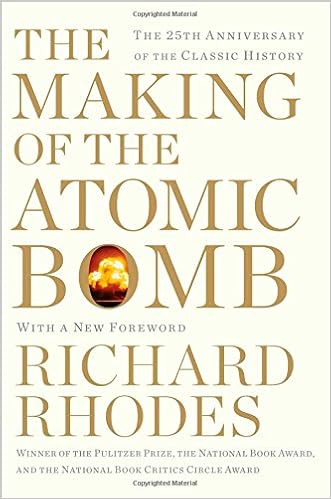
A quick note for anyone deciding which edition to buy: The "25th Anniversary Edition" removes the book's final chapter completely, which feels utterly disingenuous and revisionist to me. While Rhodes' "Dark Sun" covers the same ground as the omitted epilogue, this edition ends so abruptly I'm amazed there wasn't an advertisement for the other books in his "nuclear anthology" on the final page. The Kindle version is somewhat flawed; there are quite a few typos and dropped punctuation, and it's not always obvious when direct quotations begin and end. I'd recommend buying one of the older physical editions if you want to read this book as it was meant to be read.
"The Making of the Atomic Bomb" is a richly detailed epic, a table-shaking beast of a book that frequently sent me on evening walks to ponder and process the last few chapters I'd read. This is more than just a book about Hiroshima, Oppenheimer, and the Manhattan Project. We get an in-depth look at the early history of atomic physics, the personalities of key scientists, politicians, and military leaders, the complex political and military issues surrounding the bomb's development and use, and the historic and social events that shaped its creation. This is NOT a beach read - better put aside two weeks and plenty of undivided attention before tackling it!
I first read this book back in 2001, and I was totally enthralled by it, devouring it from cover to cover in four days. Having read it four times since then, some cracks have formed in its facade. Namely, it feels like two books grafted together - a decent one on the early history of nuclear physics, and an enthralling one on the actual making of the atomic bomb. The first 250 pages, while perhaps essential, tend to get bogged down by Rhodes' occasionally self-indulgent scene-setting (do we really need to know what shape the windows were?) and somewhat heavy philosophizing. Things pick up immensely with the actual discovery that the Uranium atom can be split, but I can see why some people give up early on. The "making of" is told with a remarkable lack of sensationalizing and sermonizing, and as horrific as the accounts of the actual bombings are, Rhodes is remarkably nonjudgmental about the bomb's use. People looking for pointed criticisms or historical revisionism will probably be disappointed; although Rhodes clearly abhors war, he seems to view Hiroshima and Nagasaki as the inevitable climax of an increasingly savage conflict against an enemy which refused to surrender. Considering how emotionally charged most books on nuclear weapons are, I actually admired Rhodes' somewhat pragmatic approach. Then again, it might leave others cold and confused.
Although it's not the flawless masterpiece I once held it as, "The Making of the Atomic Bomb" is still a pretty solid tome. It's big, multi-layered, thought-provoking, darkly funny, disturbing, richly detailed, philosophical... and just a tad over-rated. The first third is somewhat rough going, and, in retrospect, could have used some careful editing. The last 500 pages, however, are among the best history writing I've ever read. If the early history of nuclear weapons and nuclear physics fascinates you, give it a shot. You just need some patience going in.
No comments:
Post a Comment